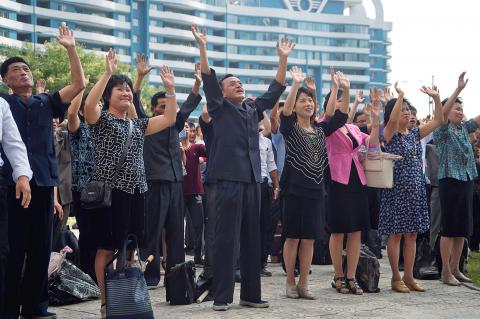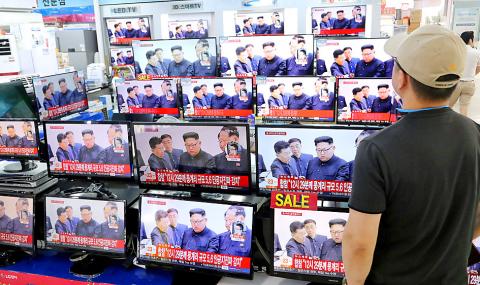North Korea’s biggest nuclear test to date was condemned around the world yesterday, with US President Donald Trump saying “appeasement” would not work as the authorities in Pyongyang “only understand one thing.”
The test was carried out at 12:29pm at the Punggye-ri site where North Korea has also conducted past nuclear tests.
The explosion of what the North said was an advanced hydrogen bomb was a “perfect success,” Pyongyang said.

Photo: AFP
Though the precise strength of the blast has yet to be determined, South Korea’s weather agency said the artificial earthquake it caused was five to six times stronger than tremors generated by Pyongyang’s previous tests.
It reportedly shook buildings in China and in Russia.
Officials in Seoul put the magnitude at 5.7, while the US Geological Survey said it was a magnitude 6.3.

Photo: Reuters
The strongest artificial quake from previous tests was a magnitude 5.3.
The explosion came just days after the North fired a missile over Japan and a few hours after Trump spoke with Japanese Prime Minister Shinzo Abe by telephone about the “escalating” nuclear crisis.
Trump, who said after last week’s missile launch that talking to Pyongyang “is not the answer,” tweeted that yesterday’s test showed North Korea’s “words and actions continue to be very hostile and dangerous to the United States.”
China had tried but failed to solve the problem, he said, while what he called South Korea’s “talk of appeasement” would not work as “they [the North Koreans] only understand one thing!”
Russia struck a more cautious tone.
“In the emerging conditions it is absolutely essential to keep cool, refrain from any actions that could lead to a further escalation of tensions,” the Russian Ministry of Foreign Affairs said, adding that North Korea risked “serious consequences.”
Moscow said talks were the only way to resolve the crisis. Russian President Vladimir Putin was due to meet later yesterday with Chinese President Xi Jinping (習近平) in China.
China urged North Korea to stop “wrong” actions and said it would fully enforce UN resolutions on the country.
South Korean President Moon Jae-in Korea chaired a National Security Council meeting and National Security Director Chung Eui-yong said Moon would seek every available measure, including new UN sanctions or the deployment of more US military assets, to further isolate Pyongyang.
Officials in Seoul also said Trump’s national security adviser, Lieutenant General H.R. McMaster, spoke with Chung for 20 minutes in an emergency phone call about an hour after the detonation.
British Secretary of State for Foreign and Commonwealth Affairs Boris Johnson called the nuclear test “reckless” and a “provocation.”
“They seem to be moving closer towards a hydrogen bomb which, if fitted to a successful missile, would unquestionably present a new order of threat,” he told Sky news, adding that there were no palatable military solutions.
French President Emmanuel Macron urged the UN Security Council to act.
“The international community must treat this new provocation with the utmost firmness, in order to bring North Korea to come back unconditionally to the path of dialogue and to proceed to the complete, verifiable and irreversible dismantling of its nuclear and ballistic program,” he said in a statement.
The International Atomic Energy Agency, which has no access to North Korea, called the nuclear test, Pyongyang’s sixth since 2006, “an extremely regrettable act” that was “in complete disregard of the repeated demands of the international community.”
North Korea’s state-run television broadcast a special bulletin yesterday afternoon to announce the test. It said leader Kim Jong-un attended a meeting of the ruling party’s presidium and signed the go-ahead order.
Earlier in the day, the party’s newspaper ran a front-page story showing photographs of Kim examining what it said was a nuclear warhead being fitted onto the nose of an intercontinental ballistic missile.
The photos showed Kim talking with his lieutenants as he observed a silver, peanut-shaped device that the state-run media said was a thermonuclear weapon designed to be mounted on the North’s “Hwasong-14” intercontinental ballistic missile.
The North claims the device was made domestically and has explosive power that can range from tens to hundreds of kilotons. Outside experts suggested the yield of the device tested yesterday might be in that ballpark, though closer to the lower range.

DAREDEVIL: Honnold said it had always been a dream of his to climb Taipei 101, while a Netflix producer said the skyscraper was ‘a real icon of this country’ US climber Alex Honnold yesterday took on Taiwan’s tallest building, becoming the first person to scale Taipei 101 without a rope, harness or safety net. Hundreds of spectators gathered at the base of the 101-story skyscraper to watch Honnold, 40, embark on his daredevil feat, which was also broadcast live on Netflix. Dressed in a red T-shirt and yellow custom-made climbing shoes, Honnold swiftly moved up the southeast face of the glass and steel building. At one point, he stepped onto a platform midway up to wave down at fans and onlookers who were taking photos. People watching from inside

A Vietnamese migrant worker yesterday won NT$12 million (US$379,627) on a Lunar New Year scratch card in Kaohsiung as part of Taiwan Lottery Co’s (台灣彩券) “NT$12 Million Grand Fortune” (1200萬大吉利) game. The man was the first top-prize winner of the new game launched on Jan. 6 to mark the Lunar New Year. Three Vietnamese migrant workers visited a Taiwan Lottery shop on Xinyue Street in Kaohsiung’s Gangshan District (崗山), a store representative said. The player bought multiple tickets and, after winning nothing, held the final lottery ticket in one hand and rubbed the store’s statue of the Maitreya Buddha’s belly with the other,

Japan’s strategic alliance with the US would collapse if Tokyo were to turn away from a conflict in Taiwan, Japanese Prime Minister Sanae Takaichi said yesterday, but distanced herself from previous comments that suggested a possible military response in such an event. Takaichi expressed her latest views on a nationally broadcast TV program late on Monday, where an opposition party leader criticized her for igniting tensions with China with the earlier remarks. Ties between Japan and China have sunk to the worst level in years after Takaichi said in November that a hypothetical Chinese attack on Taiwan could bring about a Japanese

‘COMMITTED TO DETERRENCE’: Washington would stand by its allies, but it can only help as much as countries help themselves, Raymond Greene said The US is committed to deterrence in the first island chain, but it should not bear the burden alone, as “freedom is not free,” American Institute in Taiwan Director Raymond Greene said in a speech at the Institute for National Defense and Security Research’s “Strengthening Resilience: Defense as the Engine of Development” seminar in Taipei yesterday. In the speech, titled “Investing Together and a Secure and Prosperous Future,” Greene highlighted the contributions of US President Donald Trump’s administration to Taiwan’s defense efforts, including the establishment of supply chains for drones and autonomous systems, offers of security assistance and the expansion of